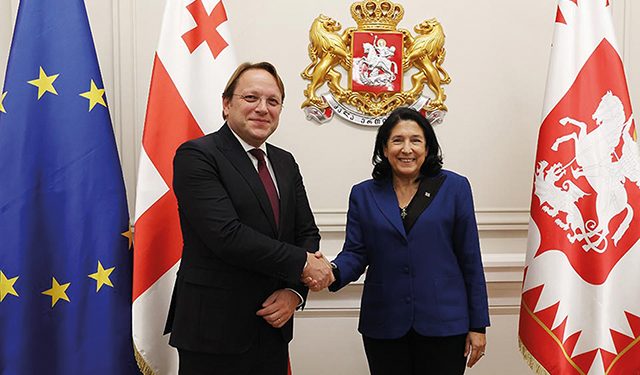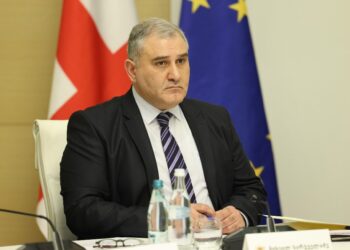EU Commissioner for Neighborhood and Enlargement Olivér Várhelyi visited Georgia this week. Georgian Prime Minister Irakli Garibashvili and the European Commissioner met in person and extended format, which was followed by a joint press conference. The dynamic of the implementation of the European Commission’s recommendations and Georgia’s significant progress toward European integration were the main topics discussed at the meeting. It was highlighted that 2022 has seen an abundance of bilateral visits, which reiterates the high level of political dialogue between the EU and Georgia. As Garibashvili remarked, the authorities are ready to fulfill assumed responsibilities in order to achieve rapid progress on the path to EU membership, and a number of important steps have already been taken in this direction.
Várhelyi emphasized that he sees the steps taken towards the implementation of the 12 recommendations of the European Commission, although the country will have to “work a lot” to show its readiness for EU candidacy.
“I see the development, the economy is booming, I went through the city and it is obvious to everyone that the economy has been developing over the last year. Progress can be seen,” Várhelyi said.
He stated that he came to Georgia for the first time not only with the mandate of the European Commissioner for the issues of neighborhood policy but also for enlargement.
“During this period of difficulties that we are facing, and this new geopolitical pressure situation, Georgia has shown us very clearly that joining the European Union is a strong and solid goal of Georgia, and for this long-term stability and peace are needed. We have heard this message and I have come not only to say that we have heard this message but also to inform you that we are ready to fulfill this request,” he said.
Várhelyi noted that the vast majority of the population of Georgia supports joining the European Union, and this is a very strong mandate not only for the government but also for the entire political elite, adding that for this it is necessary to fulfill the EU’s 12 recommendations.
“We came with a very clear objective: we want to help to get Georgia ready to become a member of the European Union within our generation,” he said. “In the coming weeks and months, we will have to work very hard and we need Georgia to work very hard to demonstrate its readiness to become a candidate country. However, I also have to underline that, of course, this can only come true if the whole country, the whole of Georgia, and all Georgians, inside or outside the country, work for this common goal.
“I am convinced that history never offers the same chance twice. So, we need to grab it and make it happen. Of course, to be able to do that, we will need delivery on the 12 priorities. We need a clear track record of their delivery. I am very pleased to see that steps have already been taken, and very important decisions and proposals are being made and prepared in the Parliament. I see that the Government is very active in working to complete the actions for achieving the 12 priorities.”
He added that the faster Georgia fulfills the 12 recommendations, the faster it will advance on the road to Europe.
“The faster Georgia fulfills these points, the faster the citizens of Georgia will receive the benefits that come by the granting of candidate status. We have no time to lose,” he said.
Várhelyi stated that in light of Russia’s war in Ukraine, the European Union needs reliable partners and allies in the fields of security, economy and, above all, energy. He noted that Georgia can be such a partner.
“The Black Sea is the center of our plans. The Black Sea power cable is very symbolic for everyone. Historically symbolic to the extent that it will connect Georgia and the Caucasus with Europe. It is also symbolic because, against the backdrop of Russia’s war, Ukraine needs reliable partners and allies, be it in the fields of security or economy, but most of all in the energy field. Georgia can be such a reliable partner and ally. We create partnerships around us, and the message I brought to Georgia is this: We want to have a partnership in terms of reliable energy supply from Georgia, and through this initiative, energy security will be established in Georgia, the Caucasus and Europe. With this cable, we will be able to fulfill this goal,” he said.
Várhelyi added that the digitized deep-sea cable is also connected to this project, the results of which will be tangible soon. “I hope new ideas will emerge. A few days ago, I heard that Georgia is going to build an electricity terminal, which will create additional opportunities and productivity for Europe. We are interested to explore this opportunity and see how we can expand our partnership and cooperation.
“We see that work has begun on the Black Sea, we are participants in this process, and I hope that it will not only connect the Black Sea but also in other directions… and trade will grow, as it once was between our regions,” he said.
President of Georgia, Salome Zurabishvili, also met with Varhelyi, at the Orbeliani Palace. They discussed Georgia’s European perspective, the candidate status issue, and implementing the EU’s 12-point recommendations, focusing on the necessity of depolarization.
“The objective of my visit is to assist Georgia in its EU integration process. In this regard, we wish to move forward with you,” stated the European Commissioner. After meeting with the president, Varhelyi Tweeted: “We support Georgia to meet its commitments to the 12 priorities. EU strongly & consistently reaffirmed its support for Georgia’s sovereignty & territorial integrity.”
By Ketevan Skhirtladze














